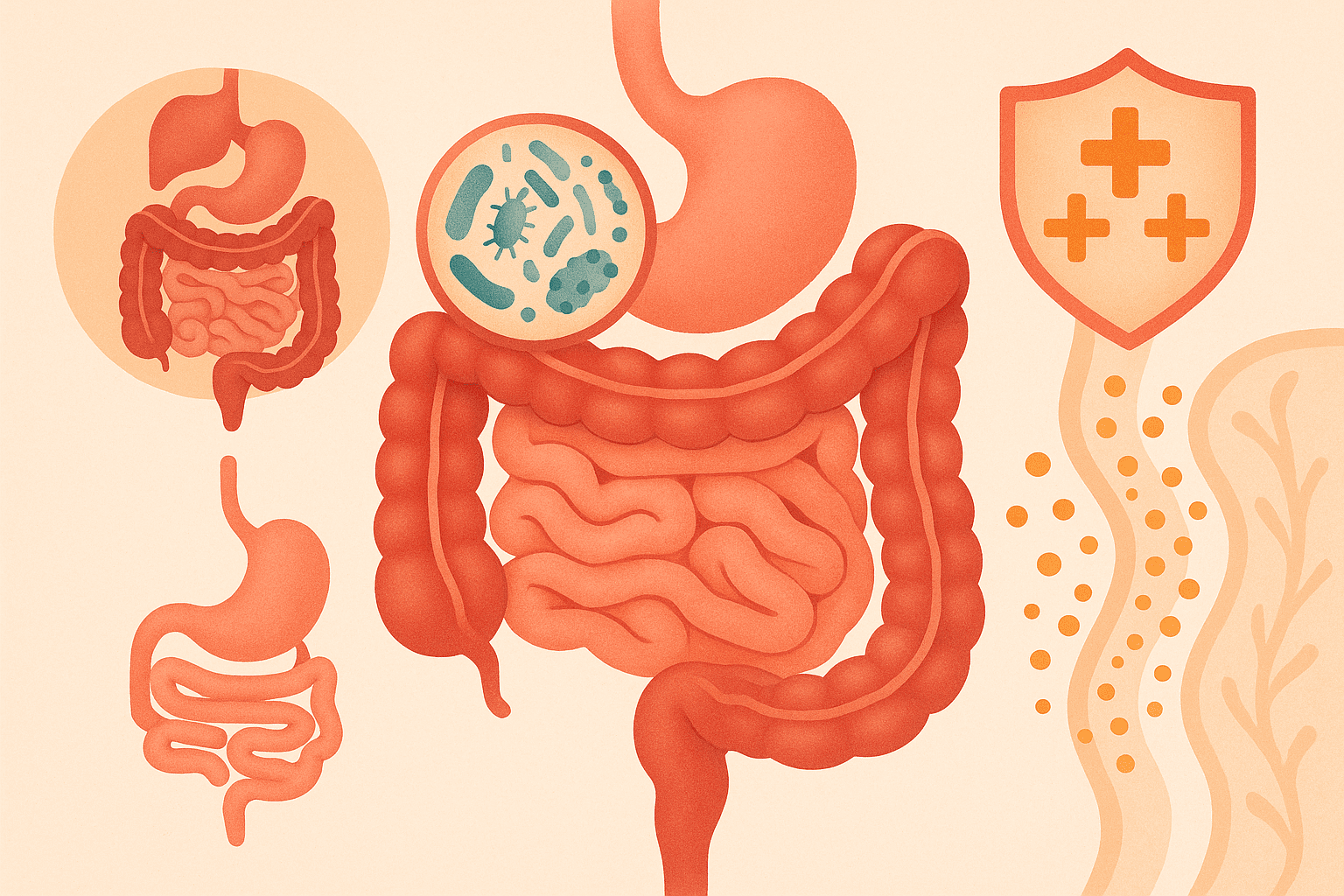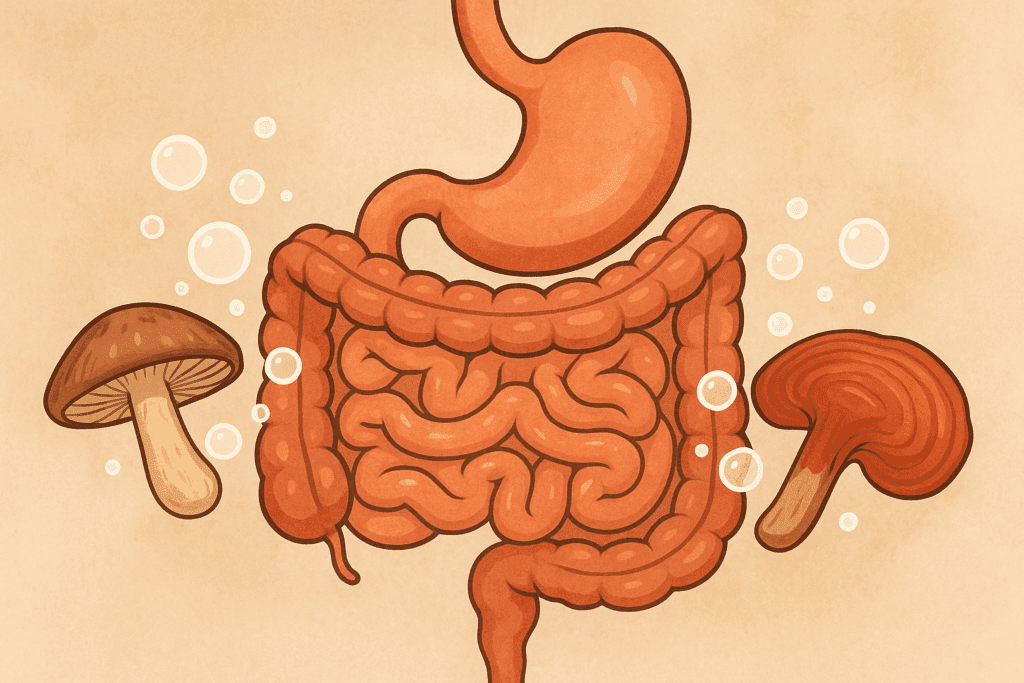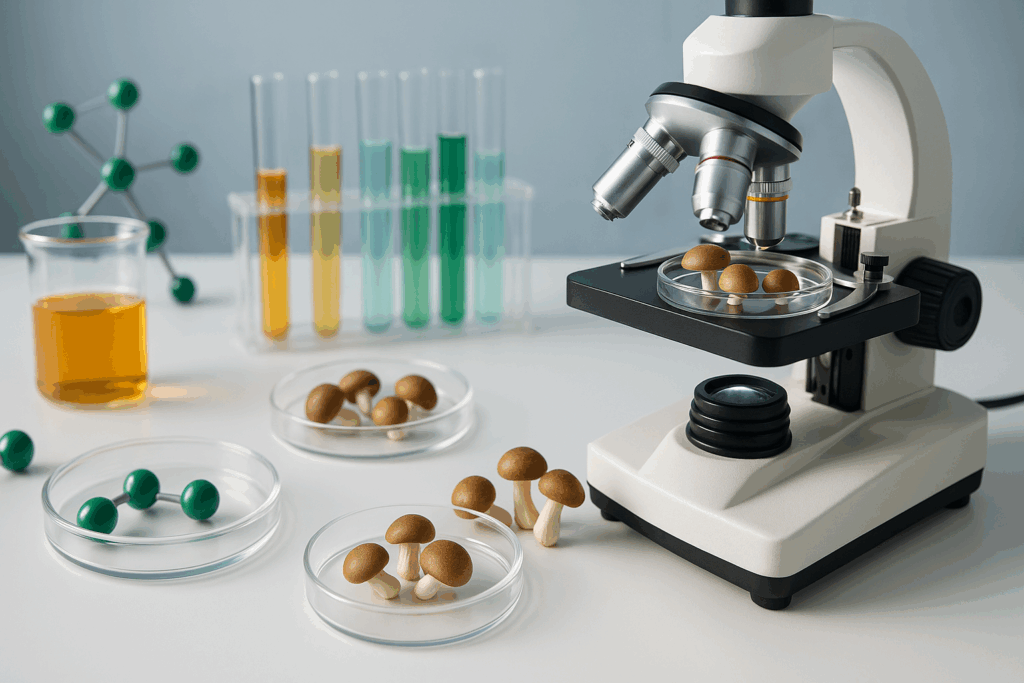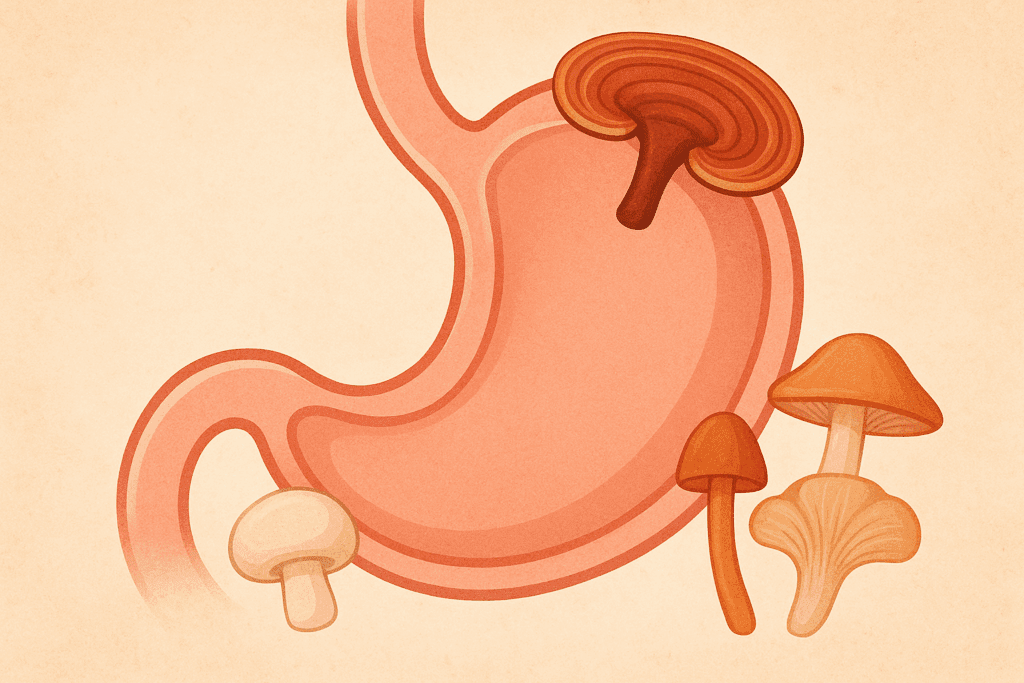Introduction: Why Gut Health Deserves the Spotlight
In recent years, conversations surrounding gut health have transcended niche wellness circles and captured mainstream attention. The surge of interest is well-founded; a growing body of scientific research now acknowledges the gut as a central player in overall health, influencing digestion, immunity, and even mental well-being. Within this evolving dialogue, one natural category of functional foods has emerged as a promising ally: mushrooms. But are mushrooms good for gut health, and can they really offer meaningful support for digestion and bloating relief? This article explores the nuanced relationship between mushrooms and gut health, delving into which varieties stand out, how they impact the microbiome, and why mushroom supplements may be an effective tool for those seeking to optimize digestive function.
You may also like: How Lion’s Mane Supplements May Support ADHD and Cognitive Clarity: What Science Says About Lions Mane for Focus and Brain Health
The Importance of Gut Health: A Foundation for Wellness
The human gut, often referred to as the “second brain,” performs a multitude of vital functions far beyond simple digestion. Housing trillions of microorganisms known collectively as the gut microbiota, this ecosystem influences everything from nutrient absorption to immune system regulation. A balanced gut microbiome contributes to efficient digestion, helps fend off pathogens, and plays a pivotal role in synthesizing essential nutrients like certain B vitamins and vitamin K. When the balance of this microbiota is disrupted—through poor diet, stress, medications, or illness—individuals may experience symptoms such as bloating, gas, constipation, or diarrhea. Over time, a compromised gut can lead to more serious systemic issues, including inflammation, metabolic disorders, and mental health challenges. In this context, identifying natural interventions that can support and restore gut health is more important than ever.
Mushrooms and Gut Health: An Intricate Synergy
Mushrooms for digestion have increasingly drawn attention for their potential to modulate gut health. These versatile fungi are rich in bioactive compounds, including beta-glucans, prebiotic fibers, polyphenols, and antioxidants, all of which may positively influence the composition and function of the gut microbiota. Importantly, the polysaccharides found in many mushrooms serve as nourishment for beneficial gut bacteria, helping them thrive and outcompete harmful microbes. Furthermore, mushrooms contain anti-inflammatory compounds that may help soothe an irritated gut lining, contributing to improved intestinal barrier function. This intricate synergy between mushrooms and gut health suggests that incorporating these functional fungi into one’s diet could yield tangible digestive benefits, particularly when complemented with other healthy lifestyle practices.

How Mushrooms Support Digestion and Alleviate Bloating
Understanding how mushrooms aid digestion requires an exploration of their unique nutritional profile. One of the standout components is dietary fiber, especially in the form of non-digestible polysaccharides like beta-glucans. These fibers escape digestion in the upper gastrointestinal tract and instead reach the colon, where they serve as fuel for probiotic bacteria. As beneficial microbes ferment these fibers, they produce short-chain fatty acids (SCFAs) such as butyrate, propionate, and acetate. SCFAs not only provide energy to colon cells but also help maintain gut pH, regulate inflammation, and reinforce intestinal barrier integrity. By fostering a gut environment that supports microbial diversity and resilience, mushrooms can promote smoother digestion and reduce symptoms like bloating and gas. Therefore, the question “are mushrooms good for digestion” can be answered with a confident yes, provided they are incorporated mindfully into an overall gut-supportive diet.
Best Mushroom Varieties for Gut Health: A Closer Look
When considering the best mushroom for gut health, not all varieties are created equal. Certain species stand out for their particularly rich content of gut-supportive compounds. Lion’s Mane (Hericium erinaceus), for instance, contains unique polysaccharides and hericenones that have been linked to neuroprotective and anti-inflammatory effects, potentially benefiting the gut-brain axis. Reishi (Ganoderma lucidum) is another notable contender, offering triterpenoids and beta-glucans known for modulating immune responses and supporting microbial balance. Shiitake (Lentinula edodes), a culinary and medicinal favorite, provides a wealth of lentinan, a polysaccharide with prebiotic and immunomodulatory properties. Turkey Tail (Trametes versicolor) boasts high levels of polysaccharide-K (PSK) and polysaccharopeptide (PSP), both of which have demonstrated immune-enhancing and microbiota-modulating effects. For those seeking the best mushroom supplements for gut health, products featuring these specific varieties offer a scientifically grounded starting point.

The Role of Mushroom Supplements: Convenience and Potency
While incorporating whole mushrooms into meals is an excellent strategy, mushroom supplements provide a level of convenience and potency that can be particularly advantageous. Mushroom powders, capsules, and tinctures often concentrate bioactive compounds, making it easier to achieve therapeutic levels without the need for large dietary intakes. For individuals seeking targeted support, mushroom powder for gut health can be mixed into smoothies, soups, or even morning coffee. However, not all supplements are created equal. It is crucial to choose products that use fruiting bodies rather than mycelium grown on grain, as fruiting bodies generally contain higher levels of the desired polysaccharides and bioactive compounds. Furthermore, consumers should seek supplements that undergo rigorous quality testing for contaminants such as heavy metals and pesticides, ensuring that the benefits outweigh any potential risks.
Are Mushrooms Good for Your Gut? Examining the Scientific Evidence
The question “are mushrooms good for your gut” has been the focus of increasing scientific inquiry. Several studies have demonstrated that mushroom-derived polysaccharides can enhance the abundance of beneficial bacteria like Lactobacillus and Bifidobacterium while suppressing pathogenic strains such as Clostridium perfringens. A 2020 review published in Frontiers in Microbiology concluded that edible and medicinal mushrooms possess prebiotic properties that could improve gut microbiota composition and function. Another study investigating Turkey Tail extract found that participants experienced significant increases in microbial diversity after supplementation. These findings suggest that mushrooms do not merely act as passive dietary fibers but actively shape the gut environment in ways conducive to health. While more human clinical trials are needed to establish dosage guidelines and long-term effects, the current evidence strongly supports the inclusion of mushrooms and mushroom supplements as part of a gut-healthy regimen.
Mushrooms for Bloating: Can They Provide Relief?
Bloating is a common digestive complaint characterized by feelings of fullness, tightness, or visible distention in the abdomen. It often results from imbalances in gut microbiota, poor digestion, or food sensitivities. Emerging research suggests that mushrooms for bloating may offer a gentle, natural solution. By promoting a healthier microbiome and enhancing digestive efficiency, mushrooms can reduce the fermentation of undigested carbohydrates—a major contributor to gas production and bloating. Moreover, the anti-inflammatory effects of certain mushrooms may help soothe the gut lining, reducing hypersensitivity and irritation that can exacerbate bloating sensations. Importantly, individuals new to consuming mushrooms should start with small amounts, as a sudden increase in fiber intake can temporarily worsen bloating before the gut microbiota adjusts. Over time, however, consistent, moderate intake of mushroom supplements or powders can support a more balanced digestive process, minimizing bloating episodes.

Practical Tips for Choosing the Best Mushroom Supplements for Gut Health
Selecting the right mushroom supplements for gut health involves more than just reading labels. First, prioritize supplements that specify the use of the fruiting body rather than mycelium, as this part of the mushroom tends to have higher concentrations of beneficial compounds. Second, opt for products that disclose beta-glucan content; higher percentages usually indicate greater therapeutic potential. Third, choose brands that provide third-party testing results, ensuring product purity and potency. Fourth, consider whether the supplement is organically certified to minimize exposure to agricultural chemicals. Finally, think about the form that best fits your lifestyle. Mushroom powders offer versatility for culinary use, while capsules provide convenience for busy individuals. Keeping these criteria in mind can make the process of finding the best mushroom supplements for gut health both informed and empowering.

Mushroom Powder for Gut Health: Culinary Creativity Meets Functional Nutrition
Mushroom powder for gut health opens the door to countless culinary possibilities. Unlike capsules or tablets, powders can be easily incorporated into daily meals, allowing for creative, functional nutrition strategies. Adding a teaspoon of Lion’s Mane or Reishi powder to smoothies, oatmeal, coffee, or soups not only enhances flavor profiles but also introduces a steady supply of gut-supportive polysaccharides and antioxidants. For individuals dealing with digestive concerns, this method ensures gradual exposure to functional compounds, minimizing the risk of gastrointestinal upset while building resilience over time. Moreover, cooking with mushroom powders can integrate gut health support seamlessly into existing routines, reducing the perceived burden of supplementation and reinforcing consistency—a key factor in achieving long-term health benefits.

Frequently Asked Questions: Mushrooms and Gut Health
1. How do mushrooms for digestion compare to traditional probiotics?
While probiotics directly introduce beneficial bacteria into the gut, mushrooms for digestion primarily act as prebiotics. This means mushrooms help nourish and sustain existing beneficial bacteria rather than adding new strains. The fibers and beta-glucans in mushrooms enhance the gut’s ability to maintain a diverse microbiome, which is essential for long-term digestive resilience. Unlike many probiotic supplements that can lose potency during storage or digestion, mushrooms for digestion offer stable, bioactive compounds that integrate seamlessly into a daily diet. Combining both strategies—probiotics and mushrooms—could offer a synergistic approach to gut health optimization.
2. Are there emerging trends in how mushrooms and gut health are being researched?
Yes, current research is increasingly examining how specific mushroom-derived compounds can target gut-brain communication pathways. This is crucial because mushrooms and gut health are intricately linked to emotional regulation through the vagus nerve and neurotransmitter production. Scientists are investigating how bioactive molecules from mushrooms like Lion’s Mane could influence mood and cognitive clarity by modulating gut flora. Emerging technologies, such as metabolomics, allow researchers to trace how mushroom compounds are metabolized by different microbiomes, offering deeper insights into personalized gut health interventions. The field is evolving rapidly, suggesting that mushrooms may soon play a central role in individualized digestive health therapies.
3. What is the best mushroom for gut health when dealing with food sensitivities?
Individuals with food sensitivities often require gentle digestive support, making Lion’s Mane a contender for the best mushroom for gut health in these cases. Lion’s Mane is less likely to exacerbate sensitivities because it has anti-inflammatory properties that may soothe an irritated gut lining. Additionally, it encourages nerve growth factor (NGF) production, which could theoretically support gut wall integrity over time. Choosing organically grown Lion’s Mane reduces exposure to pesticides, which is crucial for sensitive individuals. Incorporating this mushroom carefully, starting with low doses, offers a prudent path to exploring its potential benefits.
4. Are mushrooms good for gut health during antibiotic use?
Using antibiotics can disrupt the gut microbiome, but supplementing with mushrooms during this period may offer protective effects. Research indicates that mushrooms are good for gut health because they encourage the proliferation of beneficial bacteria even during microbiota disruptions. Turkey Tail, rich in polysaccharide-K, has shown particular promise in supporting gut microbial balance under stress. Although mushrooms are not a replacement for a medical regimen, they can serve as a complementary tool to enhance recovery after antibiotic treatment. This makes them an important consideration in holistic digestive care strategies.
5. How do mushrooms help prevent the recurrence of bloating symptoms?
Mushrooms for bloating work by addressing underlying issues rather than just masking symptoms. By nourishing beneficial gut flora, mushrooms improve the fermentation process, resulting in less gas production and smoother digestion. They also help modulate inflammatory responses within the digestive tract, minimizing irritation that often leads to bloating. Over time, regular intake of mushroom supplements builds microbial diversity, which is strongly correlated with reduced incidence of digestive complaints. Thus, rather than offering a temporary fix, mushrooms for bloating contribute to a foundation of long-term gut resilience.
6. What makes the best mushroom supplements for gut health superior to others?
The best mushroom supplements for gut health prioritize several quality markers that directly impact effectiveness. First, they should be made exclusively from fruiting bodies, which are richer in beta-glucans compared to mycelium-based products. Second, the extraction method matters; dual extraction (water and alcohol) preserves a broader range of bioactive compounds. Third, transparency around beta-glucan content and third-party testing assures users that they are getting a potent and pure product. Furthermore, mushroom supplements combined with additional gut-supportive ingredients like ginger or slippery elm can offer enhanced digestive benefits. Overall, a thoughtful formulation greatly influences the supplement’s real-world performance.
7. Can mushroom powder for gut health support endurance athletes and active lifestyles?
Absolutely, mushroom powder for gut health can offer hidden advantages to athletes and highly active individuals. Physical training places stress on the gut, often resulting in inflammation and permeability issues, commonly referred to as “leaky gut.” The adaptogenic and anti-inflammatory properties of mushrooms can help mitigate these effects. Incorporating a daily dose of mushroom powder, especially varieties like Cordyceps or Reishi, can improve not only digestion but also recovery times and energy metabolism. Athletes seeking a holistic performance edge are increasingly turning to mushrooms as part of their wellness arsenal.
8. Are mushrooms good for digestion in people with irritable bowel syndrome (IBS)?
The answer is nuanced. While mushrooms are good for digestion overall, individuals with IBS must approach them carefully due to varying FODMAP content among mushroom types. Some edible mushrooms, such as Oyster mushrooms, are lower in FODMAPs and thus better tolerated. Meanwhile, functional mushrooms like Lion’s Mane and Turkey Tail, when consumed as extracts rather than whole foods, tend to offer prebiotic benefits without triggering IBS symptoms. Consulting with a healthcare provider and starting with small doses can help determine personal tolerance. Properly selected mushrooms may provide significant gut health improvements even for sensitive individuals.
9. How does long-term use of mushrooms and gut health supplements affect microbiome diversity?
Long-term integration of mushrooms and gut health supplements appears to promote greater microbial diversity, a marker associated with resilient, disease-resistant digestive ecosystems. Unlike quick fixes that produce transient results, mushrooms gradually build a foundation of balanced microbiota. Over several months, consistent intake can shift the microbiome toward a more anti-inflammatory and metabolically beneficial profile. This improvement in microbial diversity is key not only for digestion but also for broader systemic health, including immune function and metabolic regulation. Incorporating mushrooms into a consistent daily regimen offers cumulative and compounding benefits for gut resilience.
10. Can cooking methods impact the effectiveness of mushrooms for digestion?
Yes, cooking methods can significantly influence the potency of mushrooms for digestion. Overcooking or using extremely high heat may degrade sensitive compounds like beta-glucans and antioxidants. Light sauteing, steaming, or incorporating dried mushroom powder after cooking can help preserve these beneficial molecules. Moreover, pairing mushrooms with healthy fats, such as olive oil or avocado, can enhance the absorption of fat-soluble compounds. Being mindful of preparation methods ensures that you derive the maximum gut health benefits from your culinary use of mushrooms, making them a more potent ally in your digestive wellness journey.

Conclusion: Are Mushrooms Good for Gut Health? An Evidence-Based Perspective
As the body of scientific literature continues to grow, the question “are mushrooms good for gut health” can increasingly be answered with an affirmative, evidence-backed yes. Rich in prebiotic fibers, beta-glucans, polyphenols, and anti-inflammatory compounds, mushrooms offer a multifaceted approach to supporting digestive wellness. Whether consumed as part of a whole-food diet or through concentrated mushroom supplements, these remarkable fungi demonstrate an impressive capacity to nourish the microbiome, enhance digestion, and alleviate bloating. As always, individuals should approach supplementation thoughtfully, choosing high-quality products and integrating them into a comprehensive wellness plan that includes a diverse, fiber-rich diet, stress management, and regular physical activity. In doing so, they can harness the natural power of mushrooms to cultivate not only a healthier gut but also a vibrant, resilient foundation for overall well-being.
gut microbiome support, digestive health supplements, natural remedies for bloating, prebiotic foods, functional mushrooms, immune system and gut health, beta-glucans benefits, holistic digestion support, anti-inflammatory foods, microbiome balance, natural gut healing, gut-brain connection, plant-based gut health, fiber-rich foods, medicinal mushrooms, adaptogenic mushrooms, digestive wellness strategies, immune-boosting mushrooms, natural bloating remedies, fermented foods and gut health
Was this article helpful? Don’t let it stop with you. Share it right now with someone who needs to see it—whether it’s a friend, a colleague, or your whole network. And if staying ahead on this topic matters to you, subscribe to this publication for the most up-to-date information. You’ll get the latest insights delivered straight to you—no searching, no missing out.
Further Reading:
The Effect of Mushroom Dietary Fiber on the Gut Microbiota and Related Health Benefits: A Review
The 5 Best Mushrooms for Gut Health
Important Note: The information contained in this article is for general informational purposes only, and should not be construed as health or medical advice, nor is it intended to diagnose, prevent, treat, or cure any disease or health condition. Before embarking on any diet, fitness regimen, or program of nutritional supplementation, it is advisable to consult your healthcare professional in order to determine its safety and probable efficacy in terms of your individual state of health.
Regarding Nutritional Supplements Or Other Non-Prescription Health Products: If any nutritional supplements or other non-prescription health products are mentioned in the foregoing article, any claims or statements made about them have not been evaluated by the U.S. Food and Drug Administration, and such nutritional supplements or other health products are not intended to diagnose, treat, cure, or prevent any disease.


